Today I’m going to break down exactly how the ghoster feels after ghosting someone.
Spoiler alert; They’re likely to go through a period of separation elation.
But it’s actually a little bit more complicated than that. So, within this article I’m going to show you,
- How attachment styles handle ghosting
- Our personal research on breakups and avoidants
- What a ghoster will feel when they initially ghost
- An avoidants belief system around voting
- The three major factors that are needed for a ghoster to feel regret
There’s a lot to talk about today so I’m not going to waste any time.

What Are Your Chances of Getting Your Ex Boyfriend Back?
Take the quizHow Attachment Styles Handle Ghosting
Recently, I stumbled upon an incredibly insightful article by The Attachment Project, which explored ghosting through the lens of attachment styles,
Basically the article looked at three distinct attachment styles,
- Anxious individuals
- Avoidant individuals
- Secure individuals
It was interested in finding out how each of these styles handle ghosting.
So, let’s take a look at that.
Anxious = Ghostee
The anxious attachment style, it appears, is most susceptible to ghosting. The logic behind this finding lies in the anxious individual’s innate longing for closure and continuous reassurance in a relationship. Consequently, their partner, fearing the potential reaction to a breakup, may resort to ghosting.
Avoidant = Ghoster
Next, the article highlighted those with avoidant or fearful avoidant attachment styles as the most likely to be the ghoster.
This proclivity stems from their learned behavior of indirectly ending relationships. They often employ tactics such as avoidance, withdrawal, or distance to break away from their partner.
A phenomenon I often discuss, the ‘avoidant death wheel,’ is emblematic of this behavior.
This cycle involves the avoidant individual recognizing worrying traits in their partner, forming a cache of excuses to justify their withdrawal, and eventually pulling away.
As the label implies, avoidants shy away from confrontation or conflict, often finding ghosting a simpler alternative than confronting the issue head-on.
Secure = No Ghosting At All
Lastly, the article found secure individuals to be least likely to ghost.
This finding aligns with their tendency to handle breakups in a manner deemed healthy and respectful. Instead of fleeing or obsessing over the breakup, they engage in a straightforward dialogue, explaining their perspective if they initiate the breakup, and eventually part ways in a dignified manner.
Our Research On Breakups And Avoidants:
If you grasp the connection between anxious, avoidant, and secure individuals and their tendencies to ghost, you’ll find it aligns with our internal research findings.
For instance, the main focus of this platform, aptly named Ex-Boyfriend Recovery, is to assist individuals in reconciling with exes, moving on from ex-partners, or forming healthy relationships post-breakup.
Surveys of our audience reveal that a significant portion of our clients exhibit anxious attachment styles.

What Are Your Chances of Getting Your Ex Boyfriend Back?
Take the quizThis fact aligns with the majority of inquiries we receive around ghosting are from the persepective of the individual who is the “ghostee.”
It makes perfect sense; the majority of our audience, being anxious attachers, are more prone to being ghosted.
On the flip side, most of our clients’ exes exhibit avoidant attachment styles,
This indicates they’re more likely to be the ghosters.
Now, if you are avid reader of my website then none of this should be new but lets pull on the thread a little bit.
During my research for this discussion, I found a compelling article on a website called Confidently Authentic which posits that,
People with dismissive avoidant attachment styles tend to ghost due to their deep-seated fear of intimacy. This fear often traces back to childhood experiences where they may have learned to equate love with obligation, duty, and suffocation. Therefore, while they may appear attentive initially in a relationship, they might eventually feel overwhelmed and distance themselves, possibly leading to ghosting. The problem lies within their fear of intimacy, not with the person they ghosted – a critical point often overlooked.
This understanding fits perfectly with the experiences of those being ghosted, who predominantly have anxious attachment styles.
Such individuals are natural problem solvers but also tend to self-blame.
Our research links anxious attachment styles with codependency.
Following a breakup, a codependent individual often blames themselves for an outcome not entirely their fault, perpetually pondering over what they could’ve done better rather than focusing on their partner’s shortcomings.
This idea correlates well with the ‘avoidant attachment death wheel’ concept,
Initially, an individual with an avoidant attachment style starts a relationship with enthusiasm. However, as the relationship progresses and their partner’s attachment style rubs against theirs, they may feel threatened and start self-sabotaging the relationship.
But we haven’t really covered what the main point of this article is supposed to be about yet.
What A Ghoster Will Initially Feel When They Ghost?
Our key question here revolves around a ghoster’s initial emotional state in the post-ghosting phase.
(Try saying that ten times fast.)
The answer might not be what you’d hope or expect – typically, they feel elation.
You can see this in the avoidant death wheel graphic below,
But the truth is I can’t claim credit for this idea. It actually came from one of my go-to resources on avoidant attachments, a website called freedoattach.com. It introduces the concept of ‘separation elation.’
Following the end of a relationship, individuals with avoidant attachment styles tend not to exhibit much anxiety or distress. They often experience an immediate sense of relief from the release of obligations and the feeling of reclaiming their self-identity. Thus, they don’t usually miss their partner initially. This initial relief stage, with the pressure to connect lifted, is known as the separation elation period.
I often liken this to a mini honeymoon phase.
To comprehend this, let’s look at how an avoidant attachment style functions in a relationship.

What Are Your Chances of Getting Your Ex Boyfriend Back?
Take the quizThey’ll cycle through the stages of the death wheel.
- They desire someone to love them, they find you, they date you, everything seems splendid initially.
- Then, they start noticing anxious behaviors, or their avoidant tendencies start to surface,
- leading to a self-sabotaged relationship characterized by withdrawal and distance.
- Often, they mentally prepare for the breakup for months before it happens.
- When it eventually does occur, they feel elated because, for an avoidant, the core fear is the loss of their independence.
- When they break up with you, they regain this independence, sparking their elation.
However, if you examine the full course of the death wheel, you’ll notice that this elated state doesn’t last indefinitely.
Eventually, feelings of depression and regret seep in, and they embark on the cycle again, either hopping from one relationship to another or oscillating within an on-again, off-again relationship.
An Avoidants Belief System Around Ghosting
My wife offered a fascinating perspective on an avoidant’s belief system regarding ghosting during a walk we took earlier today.
Every day the two of us go on walks and she’ll always ask me what I’m writing about and when I mentioned this topic she said something kind of brilliant that many people don’t think about or I haven’t heard many people talk about at all.
She argued that an avoidant individual initially feels no remorse or regret after breaking up or ghosting someone. This lack of remorse stems from their long-established approach to relationships and breakups.
(Nothing revolutionary so far, right?)
The term ‘ghosting’ might have been coined only in the late 2000s, but the practice has existed since time immemorial.
Ghosting is essentially a modern term for completely ignoring someone post-breakup.
What piques interest, however, is observing an individual with a strong avoidant attachment style who has ghosted someone, fully aware of the emotional harm they’ve inflicted. As they evolve towards a more secure attachment style over time, they may retrospectively regret how they handled the situation.
This maturation can occur over varying spans of time, from relatively brief to quite lengthy.
And it led me to start wondering what factors need to be present for someone who ghosts to actually regret their decisions.
Sure, we’ve talked about how avoidant attachments can regret as they go through the death wheel but what actual factors spur that on?
The Factors Behind What Makes A Ghoster Regret Their Decision
My wife believes that the ghoster needs to evolve towards a more secure attachment style, grow, and spend time without you. This personal growth and time apart allows them to reflect and possibly feel regret.
So, that very well may be one factor but I want to delve deeper, given our understanding of certain universal truths about avoidants.
For instance, avoidants often start longing for an ex once they perceive that person as unattainable.
This boils down to the concept of reciprocity.
The absence of any perceived threat of reciprocal communication, especially when they know their ex has moved on, liberates them from their inherent fear of engulfment. This freedom, in turn, gives their romantic inclinations full rein.
The unavailability of an ex, meaning the impossibility of reentering a relationship with them, sometimes elicits a perverse sense of enjoyment.
For the first time, they feel free to miss you.
They may even think nostalgically about the relationship, a sentiment that aligns with their self-belief that people won’t stick around.

What Are Your Chances of Getting Your Ex Boyfriend Back?
Take the quizAt times, they might fantasize about their partner being with someone else to trigger these feelings.
This post-relationship longing often surfaces when they fail to establish an emotional bond with new prospects, a likely outcome given their attachment style, especially if they’re a strong dismissive avoidant.
Once again, it all comes back to that death wheel and the endless revolution or cycle they are caught in,
What happens next is that an avoidant often perceives the person they ghosted as a “phantom ex” or “the one that got away.”
Interestingly, this scenario is precisely what an avoidant yearns for.
They desire a relationship with someone who won’t commit to them, as this situation doesn’t threaten their independence. If you’re in a relationship with someone who continually seeks progression – moving from dating to cohabitating, to engagement, marriage, and even parenthood – each step feels like an assault on an avoidant’s cherished independence.
The ideal scenario for an avoidant is to experience all the warm, fuzzy feelings of a relationship without having to commit fully.
They craft these “phantom exes” in their minds, the ones who got away. I believe this is a crucial factor in creating a situation where a ghoster is likely to regret their decision to ghost.
Because, let’s face it, many ghosters don’t initially regret their decision.
Three Specific Factors Need To Be Present
For regret to occur in the ghoster, I believe that three factors need to be present.
- There needs to be a long term relationsihp
- There needs to be depth to that relationship
- You need to be the phantom ex
Let’s break it down a bit.
Factor #1: The Long Term Relationship
An individual who has only known another person for a few weeks before getting ghosted is unlikely to evoke the same level of regret as someone who gets ghosted after being together for years.
Hence, to induce regret, the ghoster needs to have been in a long-term relationship.
So, what constitutes a long-term relationship?
I recall we wrote an article on this topic a few weeks ago, and found that that legally,
A long-term relationship is one that has lasted over two years.
Therefore, if you’ve been with an ex for more than two years and they ended the relationship by ghosting you, then you are potentially a candidate for inducing regret in them down the line.
Factor #2: The Depth Of The Relationship
The second factor is the depth of the relationship.
The relationship needs to have been meaningful.
It’s different if you’ve been in a friends-with-benefits situation for two years, as opposed to being in a committed, long-term relationship where you’ve discussed marriage, moved in together, and made significant progress in your relationship.
As an avoidant feels their independence being threatened, they may panic and leave.
But this often leaves unfinished business because you become the ideal phantom ex, the one that got away.
Everything about you was perfect, except for the threat they felt to their independence.
This leads us seamlessly to the third factor:
Factor #3: You Are Their Phantom Ex
You need to be the phantom ex, the one that got away.
You need to stand out.
There is an interesting symbiotic nature among these three factors.
A long-term relationship often implies a meaningful relationship, and a meaningful relationship often leads to someone being painted as a phantom ex.
If all three of these conditions are in play, you are a strong candidate for an ex to undergo the cycle of the death wheel,
They’ll likely experience separation elation, fail at finding someone else, and ultimately regret how they treated you after the breakup when they ghosted you.
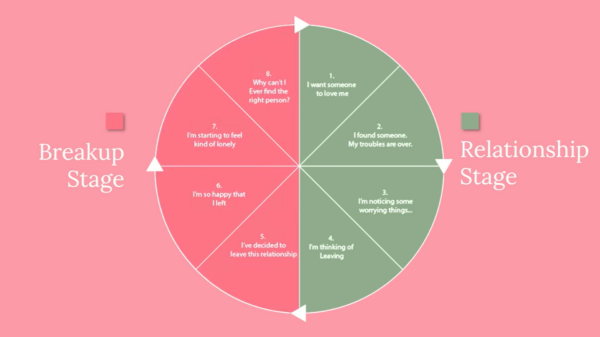
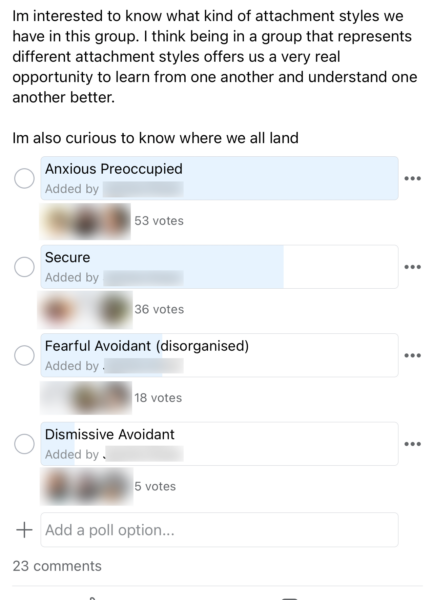
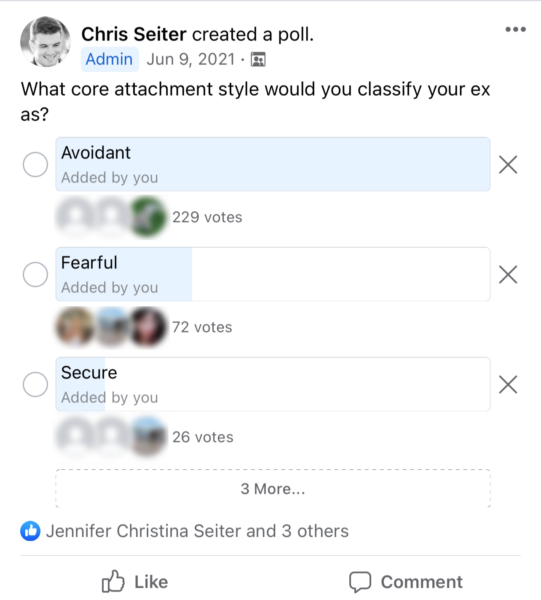
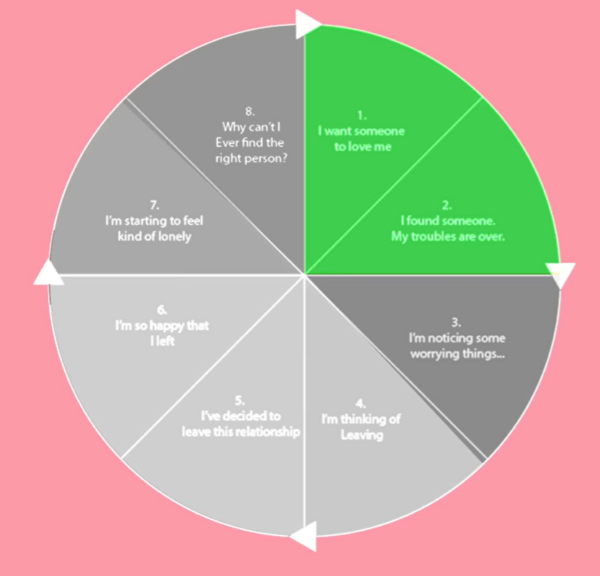
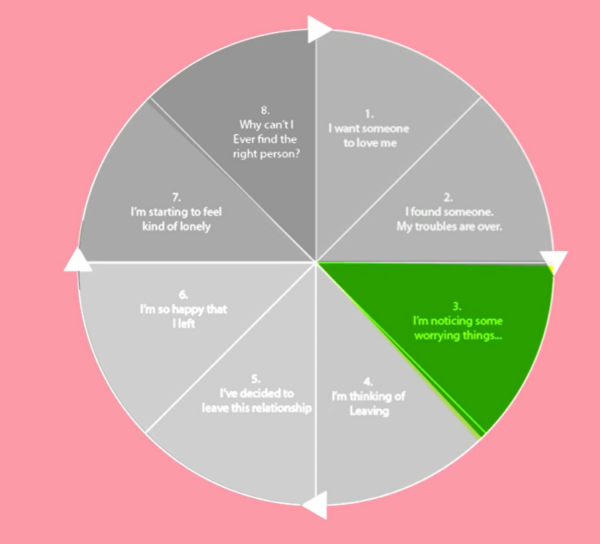
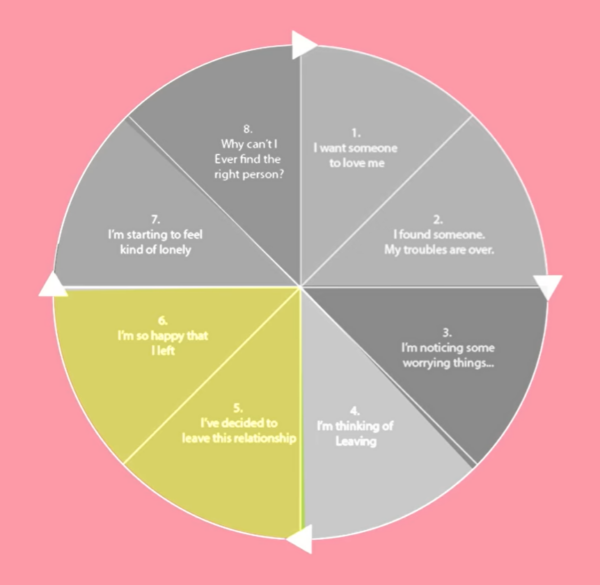
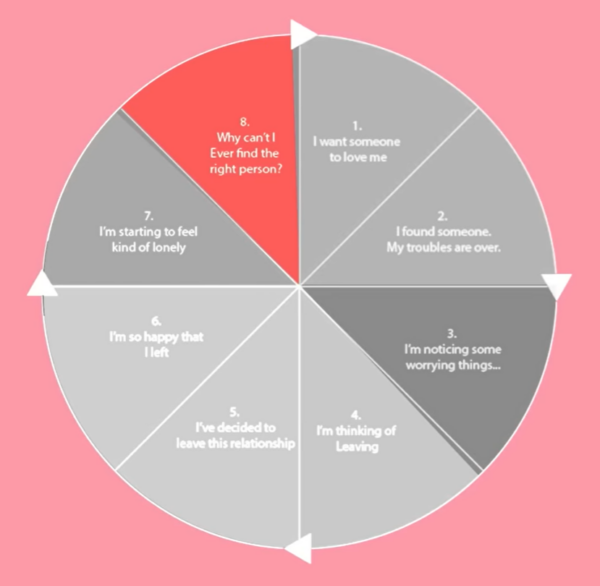
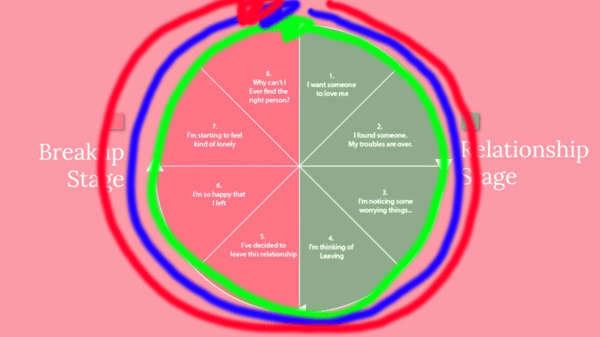
Bee
July 31, 2024 at 1:26 am
After months of being ghosted and no contact, a guy that I fell in love with sent me a “happy belated birthday” text in which I replied a day later with a pretty simple “thank you”. Two months later, last Friday to be exact he sent me a love song at 8:30 in the morning. I hearted the message two days later ….
The love song in question is “If you let me” by Sineard Harnett
I am dating again but I can admit I’m not over him in the slightest, though I don’t want to get wrapped up in a cycle, pretty sure I’m now the “ex that got away” I’m unsure of my next move.
I can’t fix myself to break silence, is it likely that he will try again?
Liz
June 8, 2023 at 9:34 pm
I want to say thank you because I’ve been learning a lot from your posts and videos. The guy I was dating for almost 2 months ghosted me 8 weeks ago. After he disappeared I texted him twice and he didn’t even read my messages, at this point I decided to go no contact, it’s been 30 days since my last attempt to reach out. I thought we had a great connection, we never fought, even last time we saw each other we didn’t argue. So I am left confused and hurt, It’s been very difficult because I think It was just a misunderstanding, maybe he got insecure and thought of leaving before I did. After learning about avoidant attachments, I think my chances of getting back together are minimal if not zero, even worse I think I will never hear from him again, and I will never have some closure; at this point that would be enough for me. I’ll try to respect his decision and I won’t contact him unless he reaches out but I really doubt it. Do you think it is possible he will contact me in the next months?
Coach Shaunna
November 12, 2023 at 6:28 am
Hi Liz, it is unlikely he is going to reach out on his own accord based on his behaviour he is showing avoidant traits to also pull away with no reason (no arguments / fall out) I would suggest that you follow a 45 days NC and then reach out to him using one of Chris’ texting styles in his articles and videos.